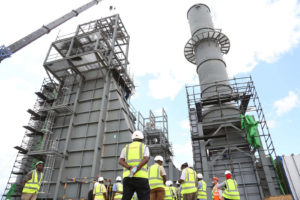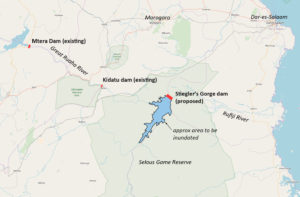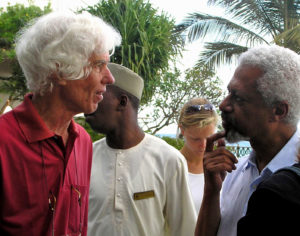by Martin Walsh
TANZANIA’S INDUSTRIALIZATION JOURNEY, 2016-2056: FROM AN AGRARIAN TO A MODERN INDUSTRIALISED STATE IN 40 YEARS. Ali A. Mufuruki, Rahim Mawji, Gilman Kasiga and Moremi Marwa. Moran Publishers for CEO Roundtable of Tanzania, Nairobi, 2017. xx + 170 pp. (e-book). ISBN 978-9966-63-0124. Available online at https://ceo-roundtable. co.tz/.
This is the most original book about economic strategy in Tanzania for many years, but its deeper purpose is to give Tanzanians confidence that they can take control of their destinies and make their nation a better place, socially as well as economically. Its authors are three leading businessmen (two of whom trained as engineers, one an accountant) and a mathematician. It demonstrates how Tanzania might industrialise: a manifesto set out in simple, direct language, supported by well-produced tables, graphs and charts. But it also shows the self-belief, and the need for cultural revival and confidence to make this happen.
The authors draw on the conclusions of the Korean and Cambridge economist Ha-Joon Chang and Justin Lin, born in Taiwan, raised in the United States, Head of Economics at the World Bank, and now Professor of Economics at the University of Beijing. From Chang and their own experiences of the Asian tigers they have realised that comparative advantages can be changed by strategic investments engineered by a pro-active state. From Lin, and from their understanding of industrial strategy in Ethiopia, they have a vision of African states which can manufacture labour intensive items such as garments or leather goods as cheaply as anywhere else in the world, provided the supporting infrastructure is effective, including the ports and reliable electric power and water, and there are supplies of skilled and semi-skilled labour and engineers capable of maintaining the machinery. As they say on page 31, “In this scenario, globalisation is our ally”.
Their strategy is to use “strategic protectionism and an active industrial policy” (p. 7). They illustrate their arguments from Malaysia, Korea, Vietnam, and even the motor industry in Uzbekistan, developed with Korean assistance to supply the Russian market. They propose to start with “light manufacturing”, including textiles and garments, footwear, electronics assembly, other consumer goods, and some of the steel, plastics and other intermediate goods which go into their manufacture. Many of these products will be for domestic markets, some exported to neighbouring African countries.
Their two key proposals for Tanzania are controversial but refreshing. In contrast to earlier proposals for developing garment manufacture which are largely based on increasing the value added of Tanzanian cotton to supply local and regional markets for clothing, theirs is to aim for a small portion of the US market for garments, to which Tanzania has tariff-free access, and to do so using a range of yarns and fabrics, most of them imported, and factories in export processing zones with reliable electricity and water supplies. Implicitly (though not stated as such in the book), if the cheapest way to clothe the Tanzanian population involves continuing to import mitumba, clothes donated to clothes banks in advanced countries, and therefore almost free other than the costs of transport, then so be it: the big prize is to be able to export almost limitless quantities of garments produced more cheaply than would be possible in China or Bangladesh.
Their second main proposal starts by recognising that gas and oil prices are not likely to rise substantially in the near future. Tanzania is not going to become a petrochemical state comparable with Nigeria or Angola. But the costs of generating power from the sun are falling rapidly, and Tanzania has plenty of sun, twelve-hour days, and no shortage of land that can be used for large solar power “farms”. The technologies to store this power during the dark hours of the night are also evolving rapidly. Different scales of solar power generation would mean that every village could be electrified, some just for lighting and the recharging of mobile phones and laptops, but many others with electricity for the operation of machines. Every Tanzanian would have 100-150 watts of solar power by 2025. The scale of the use of solar panels would make it possible to manufacture them in the country, and to export to regional and perhaps international markets. “Use of solar power will keep the environment safe. By embracing its benefits and crafting policies to encourage its use while making sure that extremely poor people are not left behind, Tanzania has the unique opportunity of becoming the world leader in the use of sustainable energy, environmental protection and growing its economy at fantastic rates” (p. 87). The proposals for developing light industries, and the coal deposits at Mchuchuma near Mbeya, and iron ore at nearby Liganga, to produce steel for the construction industry, for various light industry uses (and, presumably, for export to China), are less controversial.
There is a well written chapter on the needs to strengthen the education system, with more emphasis on the quality of the education not just the quantity, and on technical and manual skills. The chapter on finance argues for joint ventures with international companies, but with the state involved with key projects. The Tanzanian diaspora is mentioned as a possible source of finance for some projects. The final chapter, on “policy imperatives” argues for the very selective use of tax breaks and subsidies, “pioneer firms”, clusters of industries in geographically appropriate locations, special employment zones, and “experimental cities” – all with nods to China and Korea. Also for severe but sensitive regulation to coordinate investments from overseas and ensure that inappropriate behaviour is found out.
But for this reviewer the most interesting of the final chapters is on “national exceptionalism,” or developing Tanzanian culture. This includes Tanzanian national dress, local cuisine, preserving and studying the inherited local environment and its history (in which colonialism is but a passing phase), poetry, literature and art, and using the media to spread knowledge of history and national values. Ultimately, it is about “Embracing the African Identity” (p. 110), while getting Tanzanians “to feel psychologically empowered and personally invested, and to triple their efforts to drive the nation forward” (while also drawing inspiration from the rest of the world). Above all it means developing the Swahili language, with mass programmes of translation and the use of Swahili in all possible circumstances. This chapter goes far beyond a narrow technocratic tool box and bears comparison with the work of Walter Rodney. It is worth getting hold of this book for this alone.
Andrew Coulson
Andrew is the author of Tanzania: A Political Economy (second edition, 2013), and Chairman of the Britain-Tanzania Society.
TANZANIA: THE PATH TO PROSPERITY. Christopher S. Adam, Paul Collier and Benno Ndulu (editors). Oxford University Press, Oxford, 2017. xxvi + 303 pp. (hardback). ISBN 978- 0-19-870481-2. £55.
This is the third volume in the ‘Africa: Policies for Prosperity Series’. The objective of the series is to provide information and analysis to assist informed debate on the challenges and choices that countries face. The contributors are international and domestic scholars who are required “to write with clarity avoiding economic jargon”.
This is very welcome: the contributions are serious studies that require some effort from the reader, but they will find that the effort is worthwhile and will be repaid with enhanced understanding. This volume has two opening chapters setting out the essentials of Tanzania’s economy and a brief history of economic and development policies since independence. Anyone working, or thinking of working, on any kind of development project in Tanzania will find that these chapters give an awareness of the national context in which they have to operate. There follow ten chapters on specific policy areas setting out both the problems and possible solutions. These may not be for the general reader but will be invaluable for those seeking up to date information on their special interest. They should be read by anyone who thinks that they have a new solution to a long-standing problem: they may find that it has been tried before.
The prefatory matter includes a five-page list of abbreviations that is itself almost worth the cost of the book. In the index, I found a reality check for old hands who might think they ‘know the country’: entries for sisal 2; for natural gas 18!
John Arnold
John was a (very junior) Administrative Officer in Tanganyika/Tanzania from 1959 to 1964. As a staff member of the Southampton University Department of Adult education he took four study tours to Tanzania between 1975 and 1990 to look at rural development. He edited Tanzanian Affairs for a short time in the 1980s.
FROM MILO AND SPECIAL TEA TO KALASHNIKOVS AND KIMPUMU: TEACHING ENGLISH IN BRUNEI AND TANZANIA. Paul Woods. CreateSpace Independent Publishing Platform, 2017. iv + 182 pp. (paperback). ISBN 978-1542527880. £4.99.
The first thing my step-father did when he retired was write his memoirs; not for publishing, more for himself – to see whether he had it in him to write a compelling narrative, and to keep him busy when suddenly he had time on his hands. It was great for the rest of us in the family; we got to pore over old photographs, and re-live stories of days gone by. And we all enjoyed reading his manuscript when he was done. He gained confidence in his writing after that and went on to write a series of history books, in a retirement well spent. He self-published all of those subsequent books, thus fulfilling one of his life dreams: to see his words in print.
A bit like my step-father, Paul Woods has written his memoirs, presumably in his own retirement, and has also taken the self-publishing route with his intriguingly titled, From Milo and Special Tea to Kalashnikovs and Kimpumu. It tells the story of Woods’ time teaching English in the 1970s, first in Brunei, then later in Tanzania, in the days of Nyerere’s Education for Self-Reliance.
Whilst his time in Brunei is surely fascinating, it is his time in Tanzania that naturally attracts our attention more. Paul Woods arrived in Tanzania in 1977 and took up a post as a primary teacher trainer with the British Council, based in the Tabora College of National Education for two years, then with a further two-year stint at the Tukuyu College of National Education.
The book chronicles his day-to-day experiences, drawing on his old diary entries and letters. There are some interesting anecdotes and snippets of information in Woods’ text, which bring life to the little I knew about late 1970s Tanzania, and help build a picture of what it meant to be an expat in Tanzania in those days.
For example, Woods tells us that no driving was allowed from 2 pm on a Sunday until 6 am on a Monday, and no petrol was sold between Friday and Monday. He tells us about the constant food shortages in Tabora, even for basic supplies like cooking oil and sugar. He tells of the hunt for the one and only Chinese restaurant in Dar es Salaam. These tales and more paint a picture of a very different Tanzania from the one we know today.
But some things Woods describes still ring true. He writes of his ten-month struggle to get his imported car cleared at Dar port, and when it is, its spare wheel has been appropriated. He writes of the constant menace of robbery and thievery. Many expats will still tell you the same kind of woes today.
One anecdote which I found especially interesting was a short entry from April 1979, when Woods reports on the taking of Kampala by 5,000 Tanzanian troops and 3,000 Ugandan exiles who entered the Ugandan capital to overthrow Idi Amin. Around that same time, Woods was in Mwanza when a Libyan warplane, agitating for Amin, flew over and dropped five random bombs, four of which fell into Lake Victoria, but the fifth landed in Butimba. According to the Daily News at the time, one person suffered head and hand injuries, and six gazelles and several birds were killed at Saa Nane Island Animal Sanctuary. Well, I never knew that.
So, for Tanzaphiles like you and I, there are many interesting first-hand tidbits and insights into a country we love, from a generation gone by. And long live self-publishing, that’s what I say. For people like Paul Woods (and my stepfather, of course), this has offered a route to get memories into print, fulfil lifelong dreams, and give us, the readers, access to stories and information that otherwise we would not have. I hope that there are other budding memoir writers out there, with stories to tell of lives led well in Tanzania of yore. I for one would like to read them.
Jimmy Innes
Jimmy lived in Tanzania for ten years in the period from 1998 to 2011 – in Zanzibar, Bukoba Rural District, Iringa, and latterly in Dar. He retains a strong affinity with the country and its people, speaks fluent Swahili, and visits at least once a year for work and/or pleasure. He is the Chief Executive of the NGO ADD International, which works for the rights and social inclusion of people living with disabilities in Africa and Asia.
TANGANYIKA TELLTALE. Arthur Loveridge (edited by John M. Loveridge). Brighton, 2015. 136 pp. (e-book). Available online at https:// archive.org/details/TanganyikaTelltale/.
Arthur Loveridge (1891-1980) was a British zoologist and curator of reptiles and amphibians at the Harvard Museum of Comparative Zoology between 1924 and 1957. He was the world’s foremost authority on the herpetology of East Africa and published five books, some 230 articles, including 189 herpetological papers. He was part of four, year-long expeditions from Harvard University between 1924 and 1940 and discovered and named numerous species. Before this appointment, he was the first curator at the then new museum in Nairobi, Kenya, between 1914 and 1920, and was a mentor for the young Louis Leakey. In 1920, he took up a position as an Assistant Game Warden in the Tanganyika Game Department in Kilosa.
This book covers his time there between 1920 and 1924. It was written sometime around 1960, but has only now been published online by his great nephew, John, who characterises him thus: “Arthur Loveridge was extremely methodical, rigorous and organized in his work; all of his activities were carefully planned and executed” (p. 5)” This obsessive concern with order and neatness earned Loveridge the nickname “The Demon Curator” at Harvard.
The author was inspired by a friend who complained that he always wrote about animals but not people. Hence, this book is about the people that he worked with and encountered during his time in the Game Department. In reading the book it helps to know a little about Loveridge’s obsessive personality. It is therefore not surprising that he maintains a tone of understated disapproval of the disorganised and sometimes dishonest behaviour of government officers. Another theme that recurs is his disappointment that the promised building of a natural history museum by the Department never materialised. The reader will quickly realise that the book is based on excerpts from the author’s detailed diaries, sewn together with a couple of sentences here and there. The book is divided into 19 short chapters about a variety of themes. Unfortunately, their chronological order is not always clear, and the narrative tends to get bogged down in highly detailed descriptions of complex stories about everything from the logistics of the Game Department’s frequent safaris to the unreliability of the African staff. The book begins with Loveridge arriving in Kilosa, which “was then a tiny township with a rather sinister reputation for malaria, being but 1,600 feet above sea level. On arrival at the station I was informed that the Game Department was not in the town but in the hills a couple of miles away. They had taken over some derelict buildings, ex-army property, situated in an extensive rubber plantation known as the Otto (later Kilosa) Estate” (p. 9).
A central figure in the book is “Bwana Nyama”, the Chief Game Warden of Tanganyika, whose volatile and erratic personality is the object of understated irritation by Loveridge, whose own personality was the exact opposite. Loveridge remarks that “As Game Warden the good man was handicapped not merely by his own quixotic temperament – resulting in his galloping off full tilt in diverse directions at short notice – but partly by the failure of the ill-assorted staff that he assembled, or had thrust upon him, to collaborate” (p. 8). But his feelings were ambivalent because he also writes that he liked and respected him for his enthusiasm and drive. Although not mentioned by name, this Bwana Nyama was probably Charles Swynnerton, the first game warden of Tanganyika who was a noted naturalist and expert on tsetse flies. However, Loveridge does not at all emphasise this aspect of his chief; but rather paints the picture of an eccentric and somewhat lunatic person who was always travelling, collecting flies and plants, and chasing poachers.
Another important theme is the contradictory duties of the game wardens. They were simultaneously supposed to enforce strict conservation laws while also performing animal control duties and regulating the illegal and legal trade in skins. One of the duties frequently described was animal control. The game wardens had to shoot animals that threatened the farmers’ lives and crops. Thus, the author writes on 5 May 1921, “Today I added up the rewards we have paid out during the past six months for ‘vermin’; they include 65 lions, 80 leopards, 28 wild pigs, 140 crocodile eggs; all of which were brought in by the natives”
(p. 30). These are rather disconcerting tallies in today’s world. Loveridge describes in great detail the logistics of caravans, the smuggling activities of British officials, as well as the complex interactions with African staff and farmers. Several chapters are concerned with describing the frequent safaris that the Bwana Nyama and Loveridge organised. In one chapter, he describes a foot safari to Mwanza near Lake Victoria, a distance of nearly 1,000 kilometres.
Fundamentally, the book is a collection of detailed observations of daily life in the Game Department. The author gives very little context in the form of the colonial administration’s role in Tanganyika, or an understanding of the cultural and institutional frameworks in which the events takes place. To make sense of the accounts the reader needs some knowledge of Tanganyika’s colonial history. The real value of the book is the detailed vignettes of daily life in an early colonial government department that it provides.
N. Thomas Håkansson
Thomas is Emeritus Professor of Rural Development at the Swedish University of Agricultural Sciences and Adjunct Full Professor in Anthropology at the University of Kentucky. He specialises in economic anthropology and political ecology and has conducted research on the history of intensive agriculture and political economy in Tanzania during the last 20 years. He has been interested in herpetology throughout his life and has observed and photographed reptiles and amphibians in many parts of Tanzania and Kenya.





